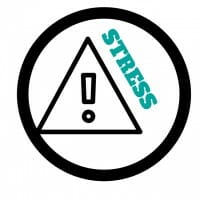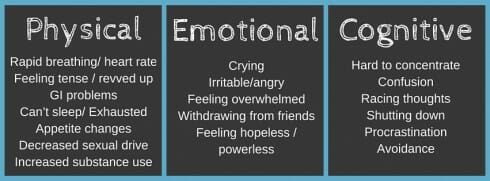
Embrace Your Stress
While it might sound strange, a little bit of stress in our lives can be a good thing.
Stress can motivate us to perform better or to study harder. However, stress becomes a problem when it starts to inhibit our ability to perform or function at our best. Read below to learn more about the effects of stress and some tips for managing it.
If your stress does become overwhelming, know you are not alone. The Office of Wellness Education or counselors at Hamel Health can teach you relaxation techniques or help you to create a plan to manage your stress.
Effects of Stress
Stress can affect us physically, emotionally and cognitively. Look at the list below and think about how stress primarily affects you.

Chronic/long-term stress that is not relieved can lead to major physical illnesses such as cardiac disease. In the short term, chronic stress can lead to depression and/or anxiety, addiction and eating disorders. It can also cause or exacerbate physical problems such as digestive issues, headaches and weight gain, and can affect cognitive functioning.
Tips for Managing Stress
Below are some tips that may help you to manage your stress. Above all, we want to acknowledge that you are the person who best knows how to manage your stress. We encourage you to think about what has helped to ease your stress in the past — music, art, running, talking to friends, sports, etc. — and to try to ensure that your destressors are a part of your weekly routine.
- Work it out! Incorporate regular exercise into your daily routine. By exercising, your pituitary gland releases endorphins that ease anxiety. Take a look at these fitness videos.
- Breathe it out! Breathe deeply. Inhale through your nose and exhale through your mouth. This gives the body enough oxygen and helps slow down your heart rate. Enjoy this guided breathing exercise.
- Relax your muscles! We often tense up our muscles when stressed. It can be helpful to do a quick body scan (sit comfortably and notice from head to toe which parts of your body feel most tense) and then use a technique called progressive muscle relaxation to ease that tension. Check out the Calm.com app or these podcasts to learn how!
- Laugh! Laughter lowers the two stress hormones in your body, adrenalin and cortisol. Enjoy this funny animal video.
- Eat it up! Eat leafy green vegetables, almonds and low-fat cottage cheese. Here are some more superfoods!
- Choose tea over coffee. Try chamomile or green tea.
- Make a list! Prioritize the things you need to do. Then, focus on one thing at time only.
- Decompress! Wrap a warm compress across your shoulders, neck or face. Use a foam roller or tennis ball to massage out body tension.
- Track your stress to notice patterns. You may not know what is causing your stress, exactly how your body responds to stress or how you cope with stress. To find out, keep a record to track the times you feel stressed. Write down what may have triggered the stress, how you felt and behaved in response to the stressful situation and what, if anything, you did to cope.

